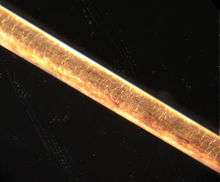haro
English
Etymology
Old French haro, harou, of unknown origin.
Interjection
haro
- (obsolete) An exclamation of distress; alas.
- (obsolete) A form of appeal in the Channel Islands, a demand for protection against harm, or for assistance to arrest an adversary.
Esperanto

homa haro, 200-obla grandiĝo
Pronunciation
- IPA(key): /ˈharo/
- Hyphenation: ha‧ro
- Rhymes: -aro
- Audio:
(file)
Finnish
Pronunciation
- Rhymes: -ɑro
Verb
haro
French
Etymology
From Middle French haro, from Old French haro, harou, from Frankish *harot, *hara (“here; hither”), akin to Old High German herot (“here; hither”), Old Saxon herod (“here; hither”), Middle Dutch hare (“here”) and English harrow.
Pronunciation
- IPA(key): /a.ʁo/
Ido
Pronunciation
- IPA(key): /ˈharo/
Derived terms
- hararacho (“mop, shock of hair;”)
- hararo (“hair”, collective)
- haropelo (“scalp”)
- harotreso (“hair-plait, pigtail, queue”)
- haroza (“hairy”)
- longhara (“long haired”)
See also
This article is issued from
Wiktionary.
The text is licensed under Creative
Commons - Attribution - Sharealike.
Additional terms may apply for the media files.